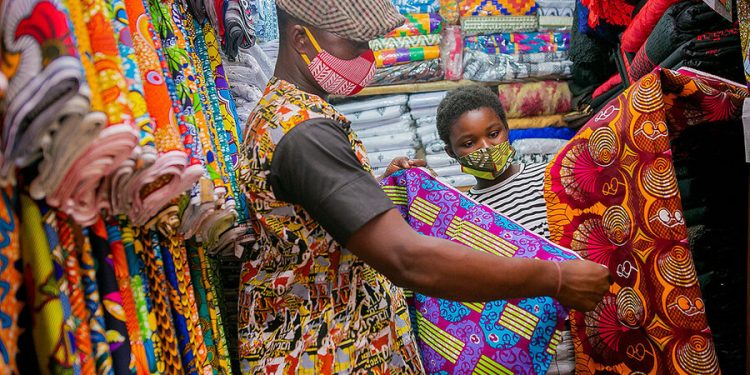The Ghanaian textile Industry is one of the critical areas in Ghana’s manufacturing sector despite its continuous struggle in recent years.
When the coronavirus pandemic hit Ghana hard in March this year, the government put in place a series of measures to contain the spread.
One of these measures was the ban on social gatherings. The ban came with a decline in demand for fabrics; as there were almost no social events which is one of the many reasons people purchase fabrics to sew new clothes.
A fabric merchant, Marie-Rose Sakey, says she has not made any significant sales since March.
“During the Lockdown, everybody was at home, they did not need to go out so demand for clothing and textile was practically non-existent. Especially for those of us who operate micro to small scale ventures. I had an order before the lockdown from the United States, but the customer told me to hold on. Even though I had all my materials and resources ready to go, I had to stop and I’m sure this delay will go into next year,” said Marie-Rose Sakey.

There is no doubt that many fabric sellers, tailors, and other merchants in the textile ecosystem have had similar conversations with their customers and have had to drastically scale down their operations.
While these entrepreneurs struggle to adjust to working in an era of a pandemic, others within the same space have found innovative ways to keep their ventures alive.
Victor Dosoo Ocansey, the CEO of Integrated Social Solution Center, who has been making Tie and Dye for over thirty years from the Art Center, also noted that although his shop is not in a location that is easily accessible to clients at the center, he is able to reach customers directly through social media.
“Initially, we thought we would have faced challenges, we thought we were going to lose our market and our clients. We thought business was going to go down as business has gone down for some people. But, surprisingly, after the lift of the ban on social gatherings, we had clients who were glued to their gadgets and were interested in shopping online. This was an opportunity for us because people were looking for designs online and found us. Social media has helped us reach customers in countries such as the United States, Britain, and Europe,” Mr Ocansey asserted.

For vendors like Ocansey, the coronavirus pandemic has been a blessing in disguise. He was able to use social media to reach clients he would ordinarily not have access to from his small workshop at the art center.
Keneth Anku, the CEO of Rose Fabrics, noticed that his mother who sells fabrics and her colleagues at the Makola Market in Accra were only limited to shoppers who could physically go to the busy market to shop and created Rosefabrics to enable them reach customers beyond the borders of Makola and Ghana.
“Makola is very congested, and our shop is not by the roadside. There were days I would go to the shop to help my mother; and I noticed that all the vendors were selling the same fabrics at the same price so customers just bought from the vendors by the streets instead of coming to find sellers like my mother whose shop was in some corner. I started brainstorming how my mother could get a competitive advantage and realized that going online was the solution,” he said.
Though the fabric industry has struggled over the years and continues to face challenges, these innovators prove that there are opportunities within the challenges if people are able to leverage technology to get access to markets beyond their immediate environment.








